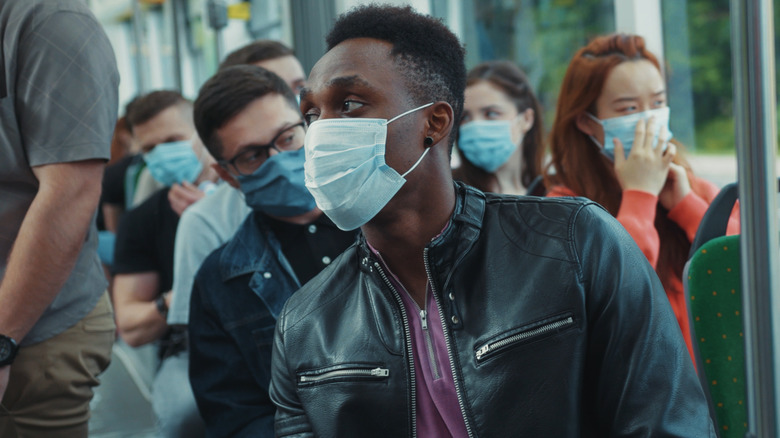Doctors Reveal How The COVID-19 Pandemic Will Come To An End
With many Americans experiencing pandemic fatigue since the initial spread of COVID-19, many are asking when the pandemic will finally come to an end. In a 2021 survey assessing social distancing behaviors in the U.S. between 2020 and 2021, it was found that as of May 2021, less than one quarter of Americans were still adhering to strict social distancing guidelines. As we approach the end of the year, it's likely these numbers may have further decreased. With a reduction in physical distancing practices, along with the lifting of face mask mandates across the country (via AARP), are we prolonging the state of the pandemic, or has the presence of vaccines revealed an end in sight?
Pediatrician and epidemiologist at Boston College Dr. Philip Landrigan believes that the key component to ending the pandemic is through continued vaccination, stating, "We have to get somewhere well north of 80%, possibly even well north of 90% of the population with immunity either through having had infection or through having had vaccinations" (via CNN). With vaccination rates across the United States at only around 58%, these numbers indicate that we still have a ways to go.
But will the end of the pandemic be measured by vaccination rates or will experts be using another means of measurement to confirm the end of the COVID-19 era?
COVID-19 will look different but may not be gone for good
Experts suggest that the end of the pandemic will be determined by a status downgrade from a pandemic to an epidemic (via CNN). However, an epidemic does not mean that the virus will have been eradicated for good. In fact, experts believe that the COVID-19 virus will not be going anywhere anytime soon and will likely continue to reemerge seasonally.
Director of the National Institute of Allergy and Infectious Diseases Dr. Anthony Fauci described what an endemic world will look like in a hearing conducted on Thursday, November 4, saying, "What we hope to get it at is such a low level that even though it isn't completely eliminated, it doesn't have a major impact on public health or on the way we run our lives. So, if we get more people vaccinated globally and more people vaccinated now, hopefully within a reasonable period of time we will get to that point where it might occasionally be up and down in the background but it won't dominate us the way it's doing right now" (via CNN).
One factor that experts say could hinder our continued progress is the further development of coronavirus variants. However, disease experts remain hopeful that one day the presence of COVID-19 will be able to be treated much like seasonal influenza. National infectious disease leader for Kaiser Permanente Dr. Stephen Parodi told CNN, "We could handle the cases just like we do with seasonal flu — where we're able to say we know we're going to see a number of cases in the winter season, and we can have the right staffing, we can have the right supplies ready and we're ready to handle it ..."


